US-China trade war
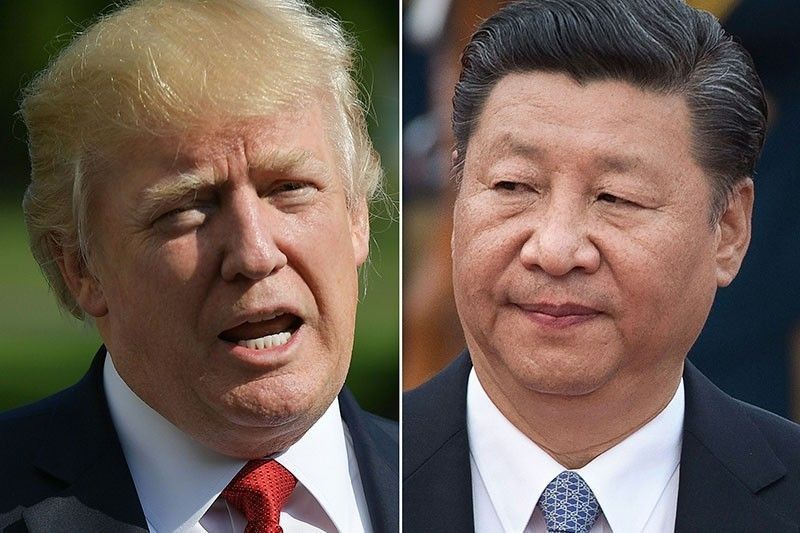
The United States and China spar over trade issues but promise to keep lines of communication open as Beijing's commerce minister paid a rare visit after a period of soaring tensions.
Minister Wang Wentao met US Trade Representative Katherine Tai on the sidelines of an Asia-Pacific Economic Cooperation trade meeting in Detroit, a day after he saw his counterpart Gina Raimondo in Washington.
Tai "discussed the importance of the US-China trade relationship in the global economy and the need for both sides to continue engaging with one another," her office says in a statement. — AFP
The United States is not looking for a new deal in its negotiations with China over trading practices but rather to address practices by Beijing that it finds objectionable, Washington's trade chief says Thursday.
US Trade Representative Katherine Tai (USTR) is pursuing talks with Beijing over the "phase one" trade agreement the countries signed two years ago, under which China committed to buying $200 billion in American goods through 2021 in exchange for relief from tariffs imposed by then-president Donald Trump.
Tai, who was appointed after President Joe Biden took office last year, tells the Senate Finance Committee her talks with Beijing on its adherence to the deal have been "very difficult."
"I think that we're not necessarily looking at another deal in the next phase, but to expanding out our focus on China's challenges beyond its commitments and compliance in phase one to the issues that were not captured by phase one," she says. — AFP
Trade relations between Washington and Beijing are at a "difficult" stage but President Biden's administration is committed to protecting the US economy from negative impacts of China's policies, the top American trade official says.
United States Trade Representative Katherine Tai says her team will "engage robustly" with China in ongoing talks over Beijing's commitments to buy American goods under a deal signed under former president Donald Trump.
"We're in a very difficult stage of this trade relationship," Tai says, adding that "the conversations are not easy." — AFP
China hails a WTO decision allowing it to slap duties on $645 million worth of US imports each year, calling on Washington to follow the ruling and "stop seeking excuses" in a long-running anti-dumping dispute.
But the move by the World Trade Organization does not mean China will automatically impose the tariffs and Beijing stopped short Thursday of announcing any fresh duties.
"We hope the US stops seeking excuses and takes immediate action to correct its wrongdoing in the trade remedy investigation against China," commerce ministry spokesman Gao Feng says.
"The WTO ruling once again proves that the US has long violated WTO rules, abused trade remedy measures, and refused to fulfil its international obligations." — AFP
President Joe Biden says his administration is working on removing tariffs on Chinese goods imposed by his predecessor, but Beijing will have to do more to meet its trade commitments.
"We're not there yet," Biden tells reporters when asked about the prospect of ending the tariffs.
At a press conference ahead of the first anniversary of his inauguration, Biden says US Trade Representative Katherine Tai is working on the issue with China but the timing is "uncertain." — AFP
The United States will in the coming days have "frank conversations" with China on trade as the Biden administration believes the Asian giant has not honored its commitments under an agreement signed in January 2020.
"China made commitments intended to benefit certain American industries, including agriculture, that we must enforce," US Trade Representative Katherine Tai will say in a speech Monday to US think tank the Center for Strategic and International Studies.
According to excerpts from her speech, which she is due to deliver at 10:00 am (1400 GMT), Tai will also announce the launch of "a targeted tariff exclusion process" for exemptions from customs tariffs imposed on $370 billion worth of Chinese goods a year by the previous Trump administration.
The punitive tariffs, imposed in retaliation for Chinese trade practices deemed "unfair", are criticized by many companies. — AFP
Washington is looking closely at the trade agreement signed with China by the Trump administration to ensure Beijing is living up to the terms, the top US trade negotiator says on Wednesday.
"With respect to the purchase commitments that the Chinese made in the US-China trade agreement, we are in the process of examining their performance and are scrutinizing all of the aspects of what they have done," US Trade Representative Katherine Tai says.
She received numerous questions on relations with China as she testified before a Senate subcommittee, and said President Joe Biden's administration is studying all its "options" for enforcing the trade pact. — AFP
Chinese President Xi Jinping at APEC touts China's 'openness' on trade, warns against protectionism — AFP
Negotiators from the United States and China will discuss the "phase one" trade deal signed earlier this year -- before the coronavirus slammed the world economy and relations between the two economic powers took a turn for the worse.
Washington and Beijing's January deal represented a partial truce in their months-long trade war, and obligated Beijing to import an additional $200 billion in American products over two years, ranging from cars to machinery to oil to farm products.
But purchases of those goods have been lagging, while US President Donald Trump has stepped up rhetoric against China ahead of what's expected to be a tough fight for a second term in the November elections, raising questions about the deal's fate as well as the possibility of a second phase of the truce. — AFP
The United States on Thursday granted Huawei another 45 days to sell to American companies while they search for alternatives to the Chinese telecommunications giant that
The extension will "allow existing telecommunication providers
The decision to provide yet another extension came hours after Washington hit the company with criminal charges alleging a "decades-long" effort to steal trade secrets from American companies. — AFP
The United States and China have signed a truce in their trade war after nearly two years of tensions, bringing relief to markets but largely leaving massive tariffs in place.
The 'phase one' deal is also a boon for Donald Trump as he faces an impeachment trial and a tough re-election fight this year, with the president hailing the agreement as "momentous".
However, with tariffs still in place on two-thirds of more than $500 billion in imports from China, US consumers and businesses will be left to foot the bill.
The agreement, part of a wider pact, includes pledges from China to beef up purchases of US agricultural goods and other exports for two years, provides some protections for US technology, and new enforcement mechanisms that allow Washington to quickly impose penalties that Beijing cannot respond to. — AFP
The United States can increase tariffs on Chinese goods if Beijing fails to live up to the partial trade deal the two countries are set to sign Wednesday, Treasury Secretary Steven Mnuchin says.
"The president has the ability to put on additional tariffs," Mnuchin says on CNBC when asked about how the agreement will be enforced.
The "phase one" agreement will call a truce after nearly two years of trade conflict. — AFP
China says Vice Premier Liu He will travel to Washington next week to sign the "phase one" deal with the United States that has lowered trade tensions between the world's two biggest economies.
The signing will cap a nearly two-year spat that threatened to throttle the global economy as the two countries exchanged tariffs on hundreds of billions of dollars worth of two-way trade.
Liu, China's top negotiator in the trade conflict, will be in the US capital from Monday to Wednesday to sign the deal, the commerce ministry says. — AFP
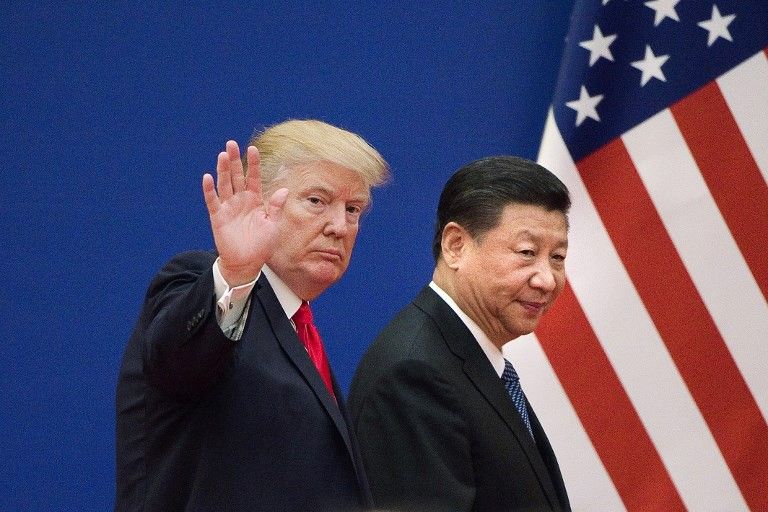
China announces Thursday a list of US chemicals that will be exempted from import tariffs, just under a week after Beijing and Washington agreed a trade agreement that a dialled down tensions between the two.
The world's biggest economies have exchanged blows for more than a year, on Friday announced a mini-agreement to reduce some levies in a bruising trade war that has dragged on global growth.
Beijing released a list Thursday of products that will no longer be subject to the tariffs, including certain types of industrial glue and adhesives, industrial polymers and types of paraffin, which can be found in cosmetics and food.
The exemptions will come into force from December 26 until December 25 next year, according to a statement from the Customs Tariff Commission of the State Council.
— Agence France-Presse
A truce in the US-China trade war offers Xi Jinping breathing space as he faces a slowing economy and political trouble in Hong Kong, but experts warn 2020 will be another tough year for the Chinese president.
The pared-down "phase one" deal announced Friday includes a reduction in US tariffs on China, in exchange for an increase in Chinese purchases of US goods and better protections for intellectual property.
But tussles over the most controversial Chinese trade practices — including steep state subsidies — have been left to future talks.
The trade war launched nearly two years ago by US President Donald Trump isn't over, analysts say, as there's always the risk of Beijing not upholding its end of the bargain and the mercurial US leader throwing more tariff bombs. — Agence France-Presse
US officials announce a truce in the trade war with China with much fanfare, but economists and trade experts call it largely a victory for Beijing.
After a dispute that raged for close to two years, with several fumbled efforts at a resolution, the US agreed to cancel planned tariffs and rollback others immediately, without a similar commitment from China to lift tariffs it imposed on the US.
"Pardon me if I don't pop champagne, but aside from a cessation of continued escalation, there is not much worth cheering," leading China expert Scott Kennedy says in an analysis of the agreement. — AFP
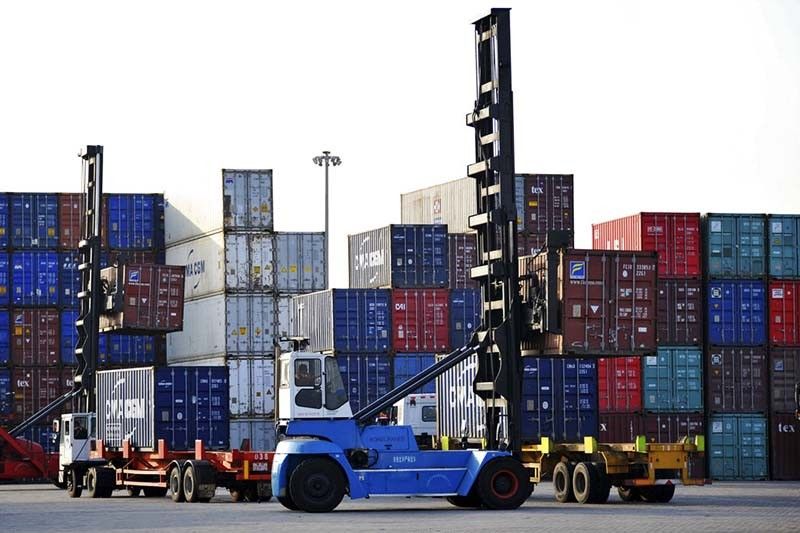
Whether Beijing and Washington reach a trade deal or not, China is already speeding up efforts to break its reliance on a country that is one of its biggest economic partners but also its biggest adversary.
The effort has gained greater urgency for Beijing after more than a year and a half of protracted negotiations, painful tariffs and US sanctions against leading Chinese technology companies.
Negotiators are working towards a potential "phase one" deal but tensions could escalate again if President Donald Trump goes through with a planned tariff hike on Sunday.
To fortify themselves for future levies or political waves, Chinese companies are looking to new markets, adapting supply chains, sourcing homegrown parts and shifting to domestic suppliers. — Agence France-Presse
Beijing and Washington are "maintaining close communication" over a much-anticipated phase one trade deal, China's commerce ministry said Thursday, reiterating that tariffs must be reduced as part of any agreement.
Hopes had risen that the two sides were close to reaching a mini deal, but comments from President Trump and recent US legislation backing Hong Kong pro-democracy protests and China's Uighur minority had appeared to throw the talks off track.
China's commerce ministry spokesman Gao Feng said at a press briefing Thursday that the two sides were "maintaining close communication."
He added however, that "if the two sides are to reach a phase one deal, tariffs should be reduced accordingly." — Agence France-Presse
China echoed comments from US President Donald Trump Wednesday, saying there was no deadline for signing a US-China trade deal, as tensions spiked between the two countries over human rights issues.
On Tuesday, Trump warned that efforts to resolve the spat between the world's top two economies could continue until after next November's US election, triggering a selloff in global markets.
When asked about his comments China's foreign ministry said Beijing too had no timeline for ending the protracted trade war, where on-again off-again negotiations have destabilised markets and stoked geopolitical tensions.
"We will not set any time limit on when the deal will or will not be reached," said Chinese foreign ministry spokeswoman Hua Chunying.
"This agreement and these negotiations must be based on equality and mutual respect," she told reporters at a regular press briefing in Beijing. — Agence France-Presse
US President Donald Trump said Tuesday that efforts to resolve a trade dispute could wait until after next November's US election.
"I have no deadline," Trump told reporters in London. "In some ways I like the idea of waiting until after the election for the China deal." — Agence France-Presse
Data show China's November factory activity rebounded for the first time in seven months, despite the looming threat of fresh US tariffs within weeks if Beijing and Washington fail to sign a partial trade deal.
The closely watched Purchasing Managers' Index (PMI), a key gauge of activity in the country's factories, rose to 50.2 in November, up from 49.3 last month, the National Bureau of Statistics said.
The reading is slightly above the 50-point mark that separates growth and contraction every month. — AFP
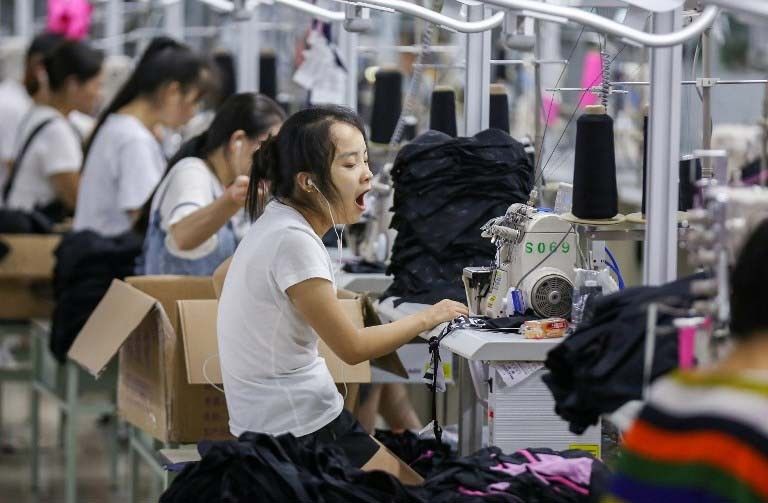
Chinese state media says top US and Chinese negotiators held phone talks and agreed to keep in touch over "remaining issues" for a "phase one" trade deal between the two countries, Chinese state media said.
US President Donald Trump had announced last month that the two sides had reached an initial agreement, but the deal is yet to be finalised.
Chinese Vice Premier Liu He spoke on the phone Tuesday morning with US Trade Representative Robert Lighthizer and Treasury Secretary Steven Mnuchin, the official Xinhua news agency reports. — AFP
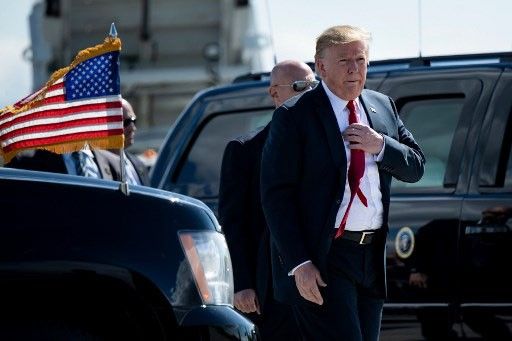
US President Donald Trump and his Chinese counterpart Xi Jinping both insist they would resist pressure to give ground on a trade deal that Washington's leader said could be "very close."
The comments from Trump and Xi came six weeks after the announcement of a "phase one" bargain, which appears no closer to becoming a reality as the two sides tussle over tariffs and China's future purchases of US farm exports.
In Beijing on Friday, President Xi Jinping said China wants a deal but is "not afraid" to "fight back" if necessary. — AFP
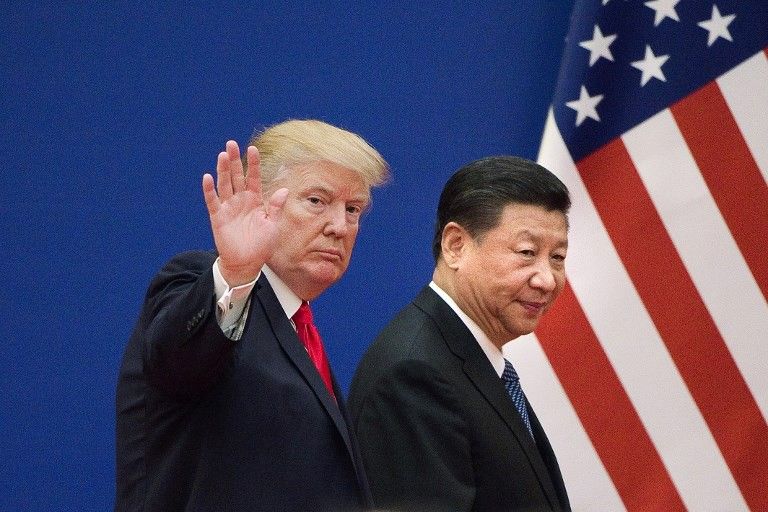
President Xi Jinping says China wants to reach an initial trade deal with the United States but is "not afraid" to fight back when necessary.
Xi made the remarks two days after US President Donald Trump complained that Beijing had not made sufficient concessions so far, making him reluctant to conclude a bargain.
The world's two biggest economies have been locked in a bruising trade conflict for more than a year, hitting each other with volleys of tariffs on hundreds of billions of dollars worth of goods. — AFP
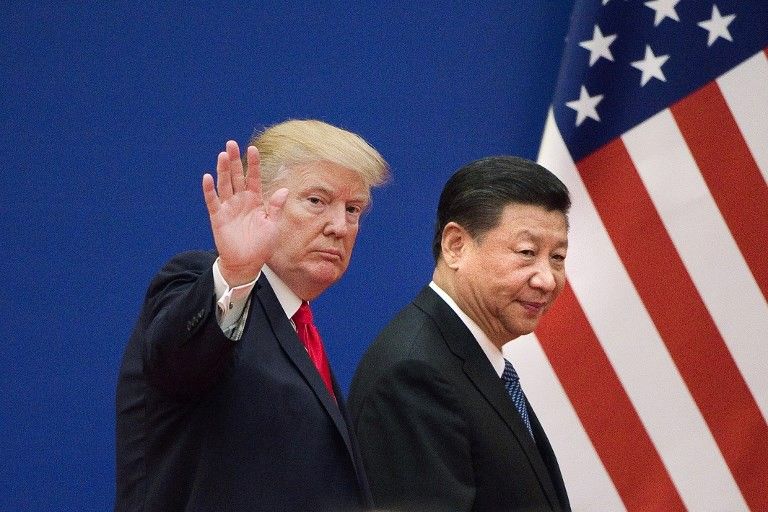
President Donald Trump says he has not agreed to roll back tariffs on Chinese imports, dampening recent optimism for a major de-escalation in the US-China trade war.
Amid a steady stream of conflicting reports, Trump's remarks appear to push back against Beijing's claims that the two sides had agreed to remove tariffs in stages as part of a partial deal announced last month.
Hopes for progress in defusing trade tensions have driven global stocks higher this month, since an agreement would remove a major source of uncertainty in the world economy that is undercutting growth. — AFP
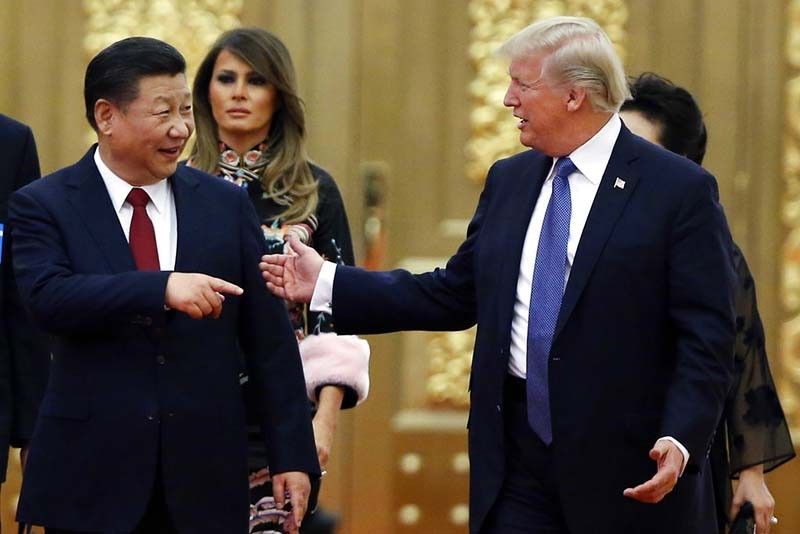
President Xi Jinping pledges to further open China's economy, declaring the world must "knock down walls" as he opened an annual trade fair against the backdrop of the US tariffs war.
Xi addresses an audience including French President Emmanuel Macron at the import exhibition in Shanghai, staged annually by China to show its willingness to open up its vast domestic markets in the face of criticism that they remain too closed.
The world community must "continue to knock down walls instead of building walls, resolutely oppose protectionism and unilateralism, (and) continuously reduce trade barriers", Xi says.
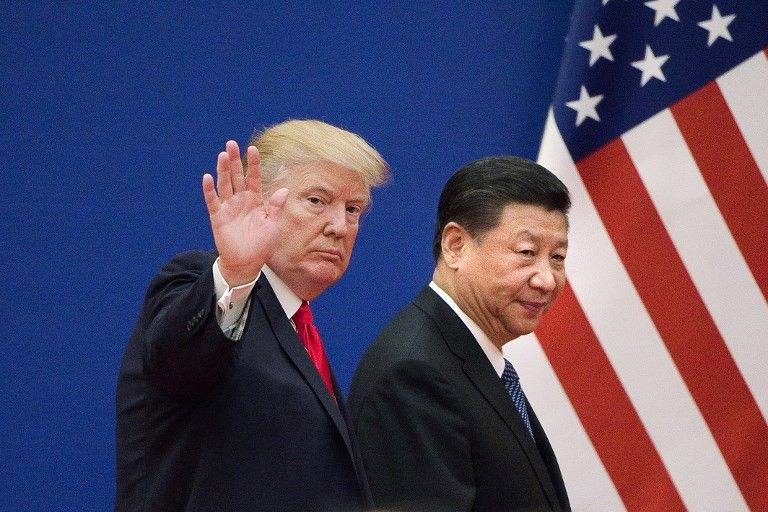
Chinese phone giant Huawei says it was ready to roll out 5G infrastructure across Southeast Asia, dismissing US warnings its tech could be used to hoover up data for Beijing.
The firm has emerged as a key protagonist in the wider US-China trade war that has seen tit-for-tat tariffs imposed on hundreds of billions of dollars worth of goods.
President Donald Trump's administration has warned Huawei's equipment could allow China to spy on other countries and has effectively blocked American companies from selling US technology to the firm. — AFP
President Donald Trump said Thursday that an alternative location for his signing of a US-China trade deal with President Xi Jinping will be "announced soon," following cancellation of an APEC summit in Chile.
The partial trade deal, known as phase one, had been due for signing on the sidelines of the regional APEC summit which Chile cancelled on Wednesday due to violent unrest in the capital Santiago.
"China and the USA are working on selecting a new site for signing," Trump tweeted. "The new location will be announced soon. President Xi and President Trump will do signing!" -- Agence France-Presse
Washington calls for action from other major world powers to spur economic growth, avoiding mention of the US-China trade war and blaming the current global slowdown on excess savings, flagging investment in China and Europe in particular.
In a statement at the conclusion of annual meetings by the World Bank and International Monetary Fund, US Treasury Secretary Steven Mnuchin says the US economy stands out on the world stage and is primed for faster growth thanks to the tax cuts and regulatory reforms championed by President Donald Trump.
Mnuchin's remarks ran counter to urgent warnings this week from the IMF, which said the US-China trade war would shave 0.8 percent from the world economy next year alone and was eating into business investment in the United States. — AFP
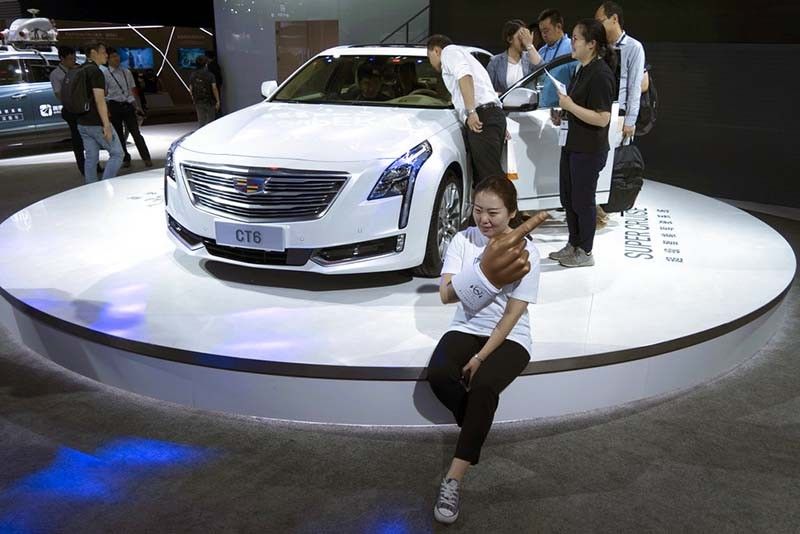
President Donald Trump says he would prefer to strike a comprehensive trade bargain with China, in comments days before top US and Chinese officials are due to resume trade talks in Washington.
But with little sign the two sides have made progress in bridging the distance between them, speculation has mounted in recent months they may reach a deal which addresses only some of Washington's extensive grievances.
"I think it's not what we prefer at all. My inclination is to get a big deal," Trump tells reporters when asked if he could accept a partial agreement. — AFP
Beijing expresses "strong dissatisfaction" after the United States announced sanctions on Chinese companies for buying Iranian oil.
China, which is embroiled in a trade war as well as myriad other disputes with Washington, is believed to be the biggest foreign buyer of Iranian oil.
Speaking to a pressure group opposed to the Iranian regime on the sidelines of the United Nations, US Secretary of State Mike Pompeo said Wednesday the actions were in response to violations of unilateral US sanctions. — AFP
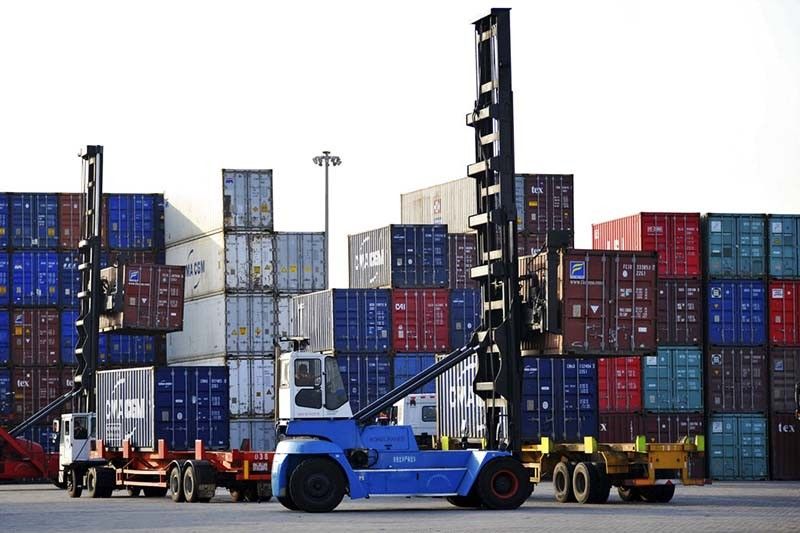
Asian markets edge up as investors turn their attention to the China-US trade talks, while keeping an eye on the Gulf region after last week's air strikes on Saudi oil facilities fanned geopolitical tensions.
With a delegation from China in the US to prepare for higher-level negotiations next month, there are hopes the economic powerhouses can find a solution to their tariffs row that has dragged on the global economy for a year.
Stock markets have enjoyed a broadly positive September thanks to hopes for the talks, with both sides appearing to offer olive branches and sounding less confrontational than they did in July and August. — AFP
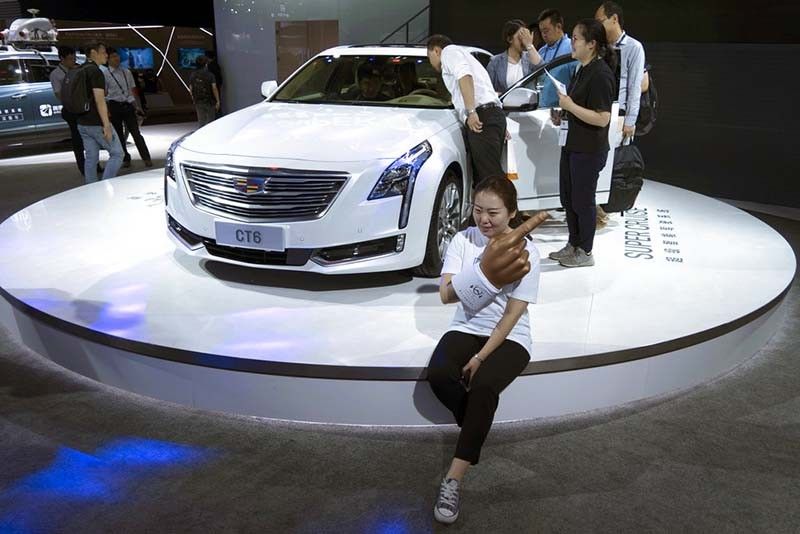
A Chinese vice finance minister will visit the United States on Wednesday to lay the groundwork for trade talks next month, state media says.
The United States and China have been embroiled in a bruising trade war for more than a year but they have eased off some of their tit-for-tat tariffs ahead of negotiations in October.
The official Xinhua news agency says vice finance minister Liao Min will lead a delegation visiting the United States on Wednesday to "pave the way" for the higher level talks. — AFP
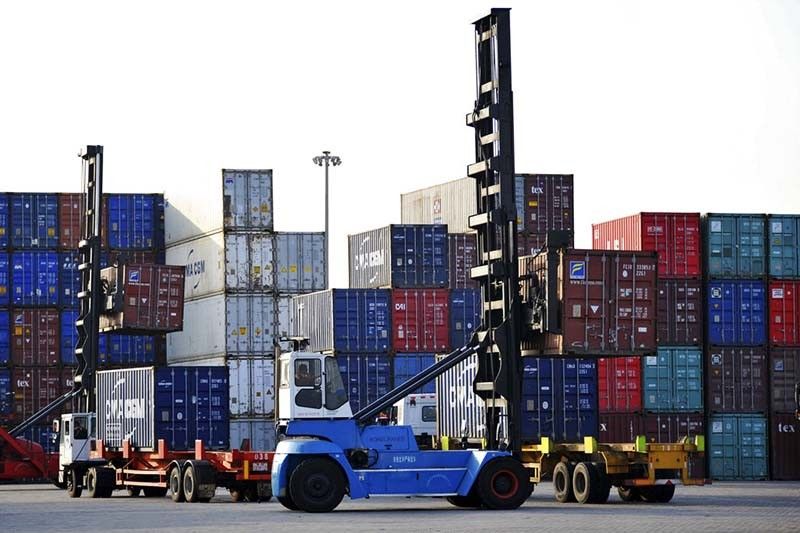
After an apparent conciliatory move by China, US President Donald Trump on Wednesday made one of his own, announcing that he agreed to delay an increase in tariffs on $250 billion worth of Chinese goods by two weeks.
Speaking weeks ahead of the resumption of talks aimed at resolving a grinding trade war, Trump said the tariff delay was requested by Beijing.
Top negotiators expect to reconvene in Washington early next month after an acrimonious summer in which trade relations deteriorated sharply and both governments announced waves of new tariffs in a stand-off that is dragging on the global economy.
"We have agreed, as a gesture of good will, to move the increased Tariffs on 250 Billion Dollars worth of goods (25% to 30%), from October 1st to October 15th," Trump tweeted late Wednesday.
He said the delay was requested by "Vice Premier of China, Liu He, and due to the fact that the People's Republic of China will be celebrating their 70th Anniversary," on October 1. -- Agence France-Presse
China says it would spare a number of US products from punitive tariffs in what is seen as an olive branch by Beijing in the protracted trade war ahead of high-level talks next month.
However, the goods do not include big-ticket agricultural items that could be crucial to the ultimate success of any agreement between the two sides, whose stand-off is dragging on the global economy.
The exemptions will become effective on September 17 and be valid for a year, according to the Customs Tariff Commission of the State Council, which released two lists that include seafood products and anti-cancer drugs. — AFP
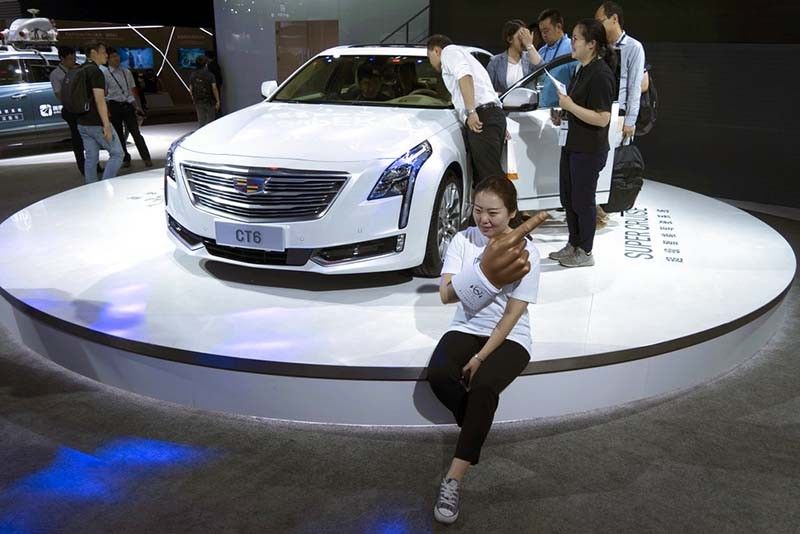
China's exports fall by 1% on-year in August, official data show Sunday, amid a bruising trade war with the US that has roiled markets in the world's top two economies.
The drop comes after a surprise 3.3% rebound in July despite the yearlong battle with Washington and weakening global demand.
But economists cited by Bloomberg had forecast a 2.2% rise ahead of the release of Sunday's figures by the customs administration.
China's trade surplus also dropped sharply in August to $34.83 billion, from $44.58 billion the previous month, while imports continued a four-month decline at 5.6 percent on-year, matching the July figure. — AFP
Tokyo stocks end higher, supported by a cheaper yen, the planned resumption of the US-China trade talks and solid US economic data.
The headline Nikkei 225 index added 0.54 percent or 113.63 points to 21,199.57, while the broader Topix index rose 0.17 percent or 2.64 points to 1,537.10.
"With hopes for progress in the US-China trade talks and strong US economic indicators that pushed up US shares, the Japanese market started with gains," Okasan Online Securities says in a note. — AFP
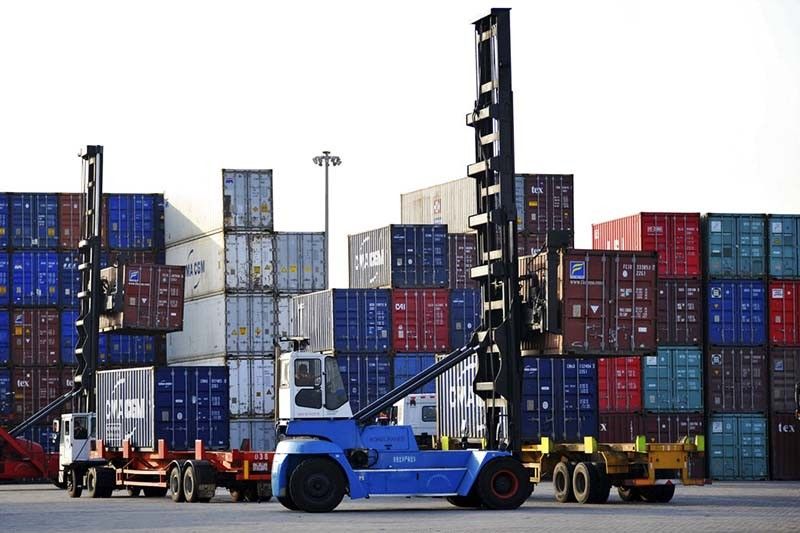
Washington moves ahead Sunday with new tariffs on Chinese imports as it steps up a high-pressure campaign aimed at coercing Beijing to sign a new trade deal even amid fears of a further slowing of US and world growth.
The additional 15% tariffs, affecting a portion of the $300 billion in goods from the Asian giant that so far has been spared, took effect at 12:01 p.m. Sunday (Manila time), according to the US Trade Representative's office.
The new tariffs will target a range of products, from foodstuffs (ketchup, butchered meat, pork sausage, fruits, vegetables, milk, cheese) to sports equipment (golf clubs, surf boards, bicycles), to musical instruments, sportswear and furniture, according to an official list. — AFP
Official data show China's manufacturing activity contracted for a fourth month in a row in August, as the US stepped up tariff pressure and domestic demand slowed.
On Sunday, the US is expected to hit billions of dollars worth of Chinese products with 15 percent duties, in a sharp escalation of a bruising trade war.
It is the first of two rounds of new tariffs. — AFP
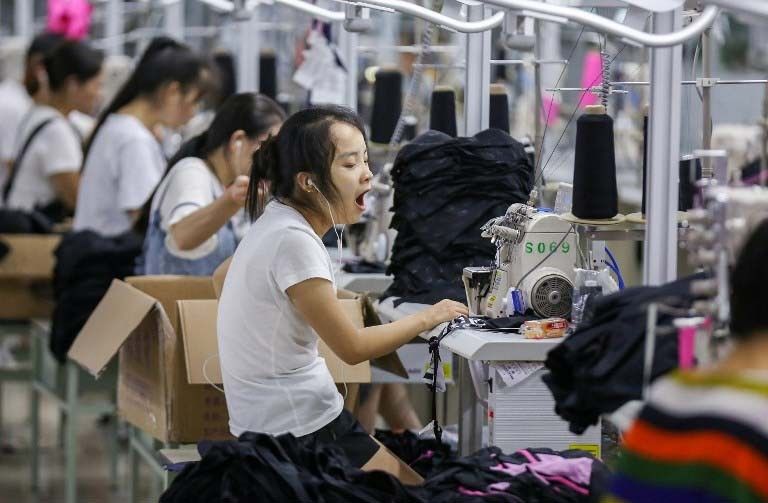
US President Donald Trump confirms that steep new tariffs on Chinese goods will kick in on Sunday and said that his economic pressure is forcing Beijing to take a more moderate line in Hong Kong.
"They're on," Trump tells reporters, two days before the levies on billions of dollars' worth of Chinese imports are set to rise in the latest escalation of the trade war between the world's two biggest economies.
Trump also says that US economic pressure on China was responsible for preventing the authorities from carrying out a harsher crackdown against pro-democracy demonstrators in Hong Kong. — AFP
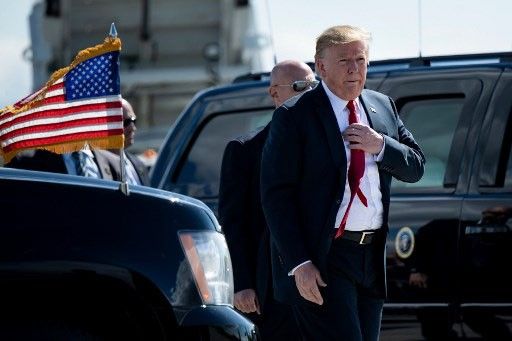
Beijing hints Thursday it may break the cycle of retaliation in the trade war with the United States, as the punishing tariff battle threatens global economic growth.
Last week China and the US exchanged the latest blows in the year-long trade dispute, with Beijing announcing it would hit $75 billion worth of US goods in retaliation for Washington taking aim at about $300 million of its goods.
US President Donald Trump lashed out immediately in return by increasing existing and planned tariffs on a total of $550 billion in Chinese products. — AFP
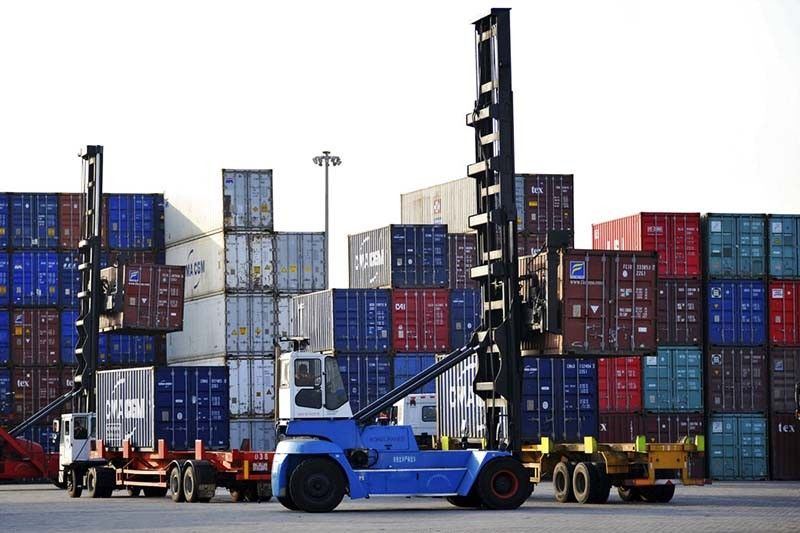
Asian markets swing, gripped by uncertainty over the China-US trade talks, with warnings that Donald Trump's unpredictability could be harming the chances of an eventual agreement.
Trading has been volatile this week after the president's weekend outburst against Beijing and announcement of more tariffs on $550 billion of goods was followed Monday by him saying the two sides had spoken by phone and negotiations would resume soon.
However, China has not confirmed such calls had taken place, while media in the country has played down the chances of more talks and the leadership's need for a deal. — AFP
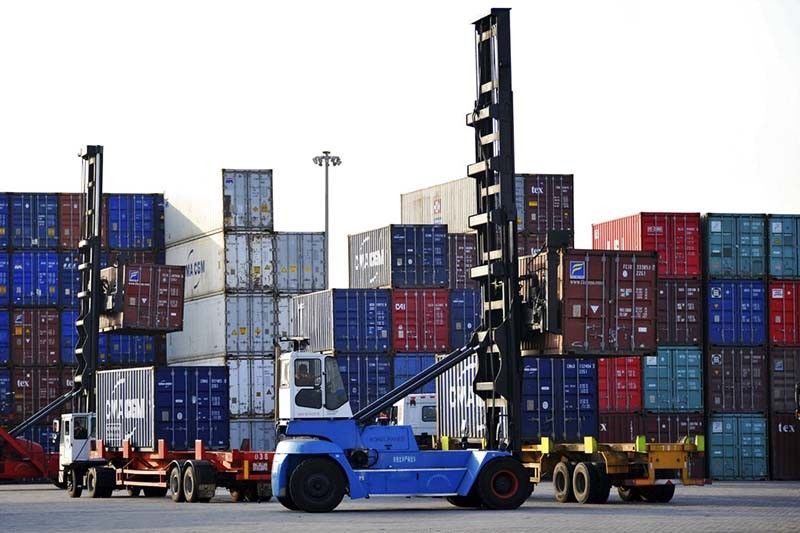
US President Donald Trump's top aides on Sunday downplayed the idea of US companies being forced to abandon China any time soon, as an edict from the president ordering businesses to start looking for alternatives has been met with skepticism.
Treasury Secretary Steven Mnuchin and White House economics advisor Larry Kudlow took to the airwaves from France, where Trump is participating in the G7 summit, to smooth out tensions in the business community prompted by Trump's Friday tweet.
Trump said he has "no plan now" to bring US companies in line, and his aides quickly reinforced the message.
"He would have the authority to do that... He has not done that," Mnuchin told "Fox News Sunday." — Agence France-Presse
Export-reliant Chinese companies are slashing prices, moving production abroad, creating new domestic markets and even rebranding goods as they try to survive the escalating trade war with the United States.
Factories along the eastern coast, fish processors in the south, apple juice exporters in central China and farmers in the northeast have all been forced to change their business models since US President Donald Trump launched the conflict more than a year ago, hitting everything from motorcycles to MRI machines.
But no matter what the survival tactic, times are tough and set get worse with newly threatened tit-for-tat tariffs meaning that virtually all trade between the world's two biggest economies would be covered.
"It's impacted all of us exporters... we include the tariffs in our quotes now," a sales manager at Shaanxi Hengtong Fruit Juice, who gave his surname as Liu, told AFP. ?— Agence France-Presse
World stock markets plunge Monday as Beijing parried US President Donald Trump's latest tariff announcements by moving to let the China yuan currency devalue and halting purchases of US agricultural products.
The rebuttal sparked Wall Street's worst selloff of the year and also led to significant declines in leading bourses in Europe and Asia amid fears the escalation of the months-long conflict will further dim the global outlook.
After markets closed in New York, President Donald Trump fired back, formally designating China a currency manipulator.
"There is a feeling that China could inflict a lot more pain on the US in terms of the trade spat, and many traders are worried the economic conflict will rumble on for some time," said IG analyst David Madden. -- Agence France-Presse
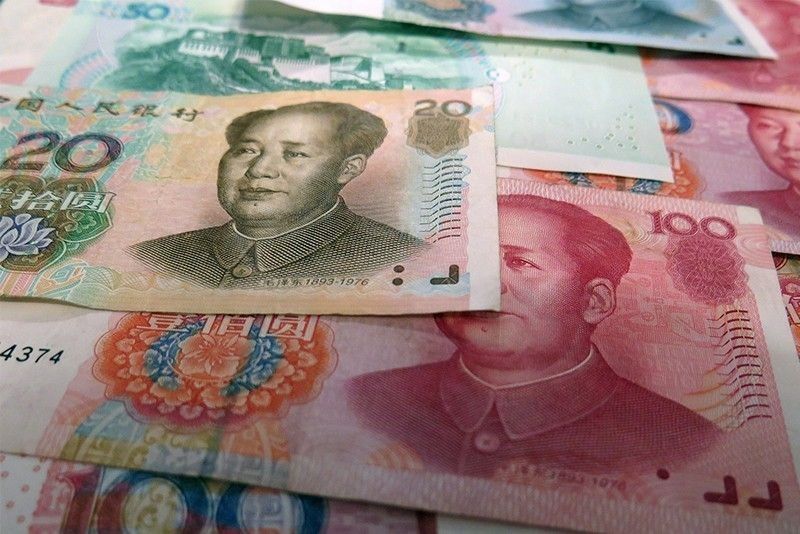
US negotiators arrive in Shanghai to resurrect trade talks with Chinese officials, with both sides downplaying expectations of an imminent deal between the world's two biggest economies.
The negotiations in the financial hub will be the first face-to-face discussions since US President Donald Trump agreed to a truce with Chinese President Xi Jinping at June's G20 summit after previous talks broke down over US accusations that China reneged on its commitments.
Washington and Beijing have so far hit each other with punitive tariffs covering more than $360 billion in two-way trade, in a tense stand-off centered on demands for China to curb the alleged theft of American technology and provide a level playing field to US companies. — AFP
A US threat to pull recognition of China's "developing nation" status at the World Trade Organisation is a pressure tactic ahead of this week's trade talks and is bound to fail, a commentary in state media said Monday.
The reaction followed a memo issued on Friday by President Donald Trump to US Trade Representative Robert Lighthizer.
It said the WTO, which operates a global system of trade rules and settles disputes, uses "an outdated dichotomy between developed and developing countries that has allowed some WTO members to gain unfair advantages."
Without "substantial progress" to reform WTO rules within 90 days, Washington will no longer treat as a developing country any WTO member "improperly declaring itself a developing country and inappropriately seeking the benefit of flexibilities in WTO rules and negotiations," said the statement, which focused mostly on China. -- Agence France-Presse
Big US companies are accelerating efforts to move more of their supply chains from China to neighboring countries in light of Trump administration tariffs.
Companies in sectors such as technology, clothing and footwear are exporting more goods from emerging giants including Vietnam and Malaysia, data show.
At the same time, the shift has exposed the murkiness of trade export rules, putting a premium on lawyers expert in the minutiae of US customs rules. — AFP
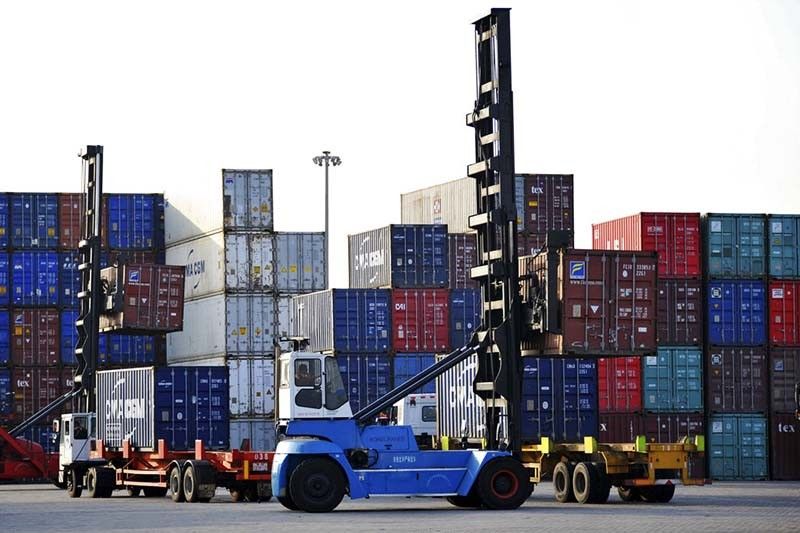
Top US and Chinese negotiators held phone talks on Tuesday as the world's top two economies seek to resolve their trade war, more than a week after they declared a truce.
Talks had broken down in May over US accusations that Beijing had reneged on its commitments, and the dispute escalated with the two sides exchanging steep increases in punitive tariffs.
But US President Donald Trump and Chinese leader Xi Jinping agreed to revive negotiations when they met on the sidelines of the G20 summit in Japan on June 29.
US Treasury Secretary Steven Mnuchin and Trade Representative Robert Lighthizer spoke with Chinese Vice Premier Liu He and Commerce Minister Zhong Shan on Tuesday.
White House economic adviser Larry Kudlow told reporters the talks "went constructively" but it was "too soon for details." — Agence France-Presse
Stock markets surged Monday after US President Donald Trump and Chinese counterpart Xi Jinping agreed on the sidelines of the G20 summit to restart trade talks, reviving hopes of an end to their tariff war.
Trump's historic visit to North Korea also at the weekend, where he met leader Kim Jong Un, further soothed geopolitical concerns and propelled the dollar, as investors shunned havens, notably gold.
Oil prices also rallied after OPEC and its oil producing allies appeared firmly on course to extend their oil output caps.
"European markets are uniformly higher, particularly the heavily China-exposed DAX" index in Frankfurt, noted Fiona Cincotta, a senior market analyst at City Index trading group.
German stocks were supported also by official data showing unemployment in Germany held steady in June.
US stocks were also solidly higher, with the DJIA index gaining 250 points at the opening bell. — Agence France-Presse
Tokyo shares soared Monday after the United States and China agreed a ceasefire in their trade war that has damaged the global economy.
The benchmark Nikkei 225 index rose 2.13 percent or 454.05 points to 21,729.97, while the broader Topix index ended up 2.17 percent or 33.71 points at 1,584.85.
-- Agence France-Presse
China's central bank chief says the country has plenty of policy tools left to handle the trade war with the United States.
There is "tremendous" room to counter the deepening trade war, People's Bank of China governor Yi Gang says in an interview with Bloomberg TV.
"We have plenty of room in interest rates, we have plenty of room in required reserve ratio rate, and also for the fiscal, monetary policy toolkit, I think the room for adjustment is tremendous," Yi says on Bloomberg TV. — AFP
Top financial policymakers from the world's 20 most powerful nations gather this weekend in Japan as a protracted US-China trade war clouds the global economy with no end in sight.
G20 finance ministers and central bankers gathering in the southwestern Japanese port city of Fukuoka will also tackle the thorny conundrum of how to tax huge multinational digital firms like Google and Facebook. — AFP
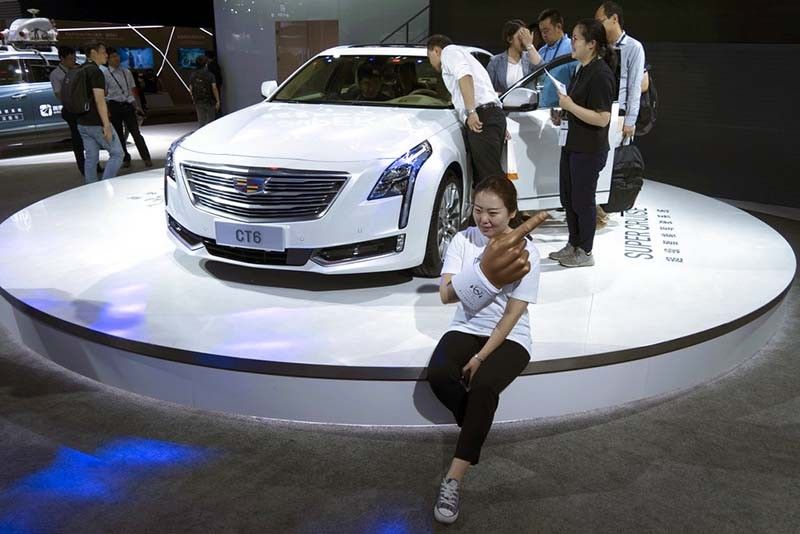
China has imposed a $23.6 million fine on US automaker Ford's joint venture for "price fixing" in violation of anti-monopoly laws -- a move coinciding with growing trade tensions with the United States.
Changan Ford Motor Co. "set a minimum resale price" since 2013 for vehicles sold in the southwestern city of Chongqing that "deprived dealers of pricing autonomy... and damaged fair competition and legitimate interests of consumers", the State Administration for Market Regulation says in a statement.
The fine amounted to four percent on the company's sales value in Chongqing in 2018, the regulator says. — AFP
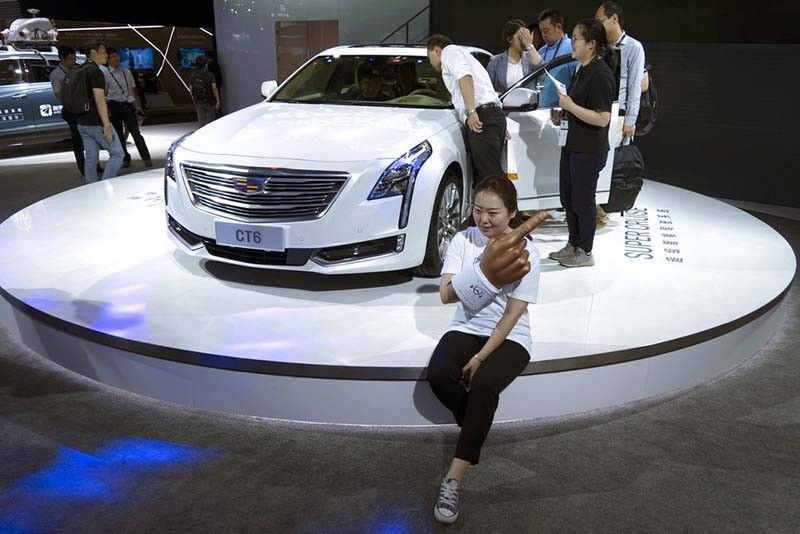
Washington's escalating trade war with Beijing has not "made America great again" and has instead damaged the American economy, China said Sunday, stressing that while it wants resolution through talks there will be no compromise on core principles.
Beijing's broadside is the latest act in a bruising conflict between the world's top two economies that has spooked markets and sparked fears about the global economy.
With trade talks stalled, the dispute has intensified in recent weeks with US President Donald Trump imposing fresh tariffs on imports from China and moving to blacklist Chinese tech titan Huawei over national security concerns.
"The (US) tariff measures have not boosted American economic growth. Instead, they have done serious harm to the US economy," the Chinese government said in a white paper, pointing to what it described as increased production costs and consumer prices in the United States and threats to economic growth. — Agence France-Presse
President Donald Trump says there is a "good" possibility that Washington and Beijing will strike a bargain ending their trade war, and it could include a settlement over blacklisted telecom firm Huawei.
"If we made a deal, I can imagine Huawei being included in some form or some part of a trade deal," Trump tells reporters during an announcement about increased aid to farmers hurt in the trade war with China.
World equities came under intense pressure Monday from new eruptions in the US-China trade war, while oil rallied on simmering tensions in the crude-rich Middle East.
Equity investors began the day in underwhelming fashion in Asia, as the lack of a US-China trade deal jarred markets.
Negative sentiment spilled over into Europe, and then to US markets where stock valuations slumped massively.
"US stocks are falling decisively in early action, amid exacerbated US-China trade tensions as last week's negotiations that ended without a deal and Friday's increased tariffs on Chinese goods by the US were met with China's retaliatory measures announced today," analysts at the Charles Schwab brokerage said.
Negotiations in Washington ended Friday without agreement and a massive US tariff hike on Chinese imports kicked in.
Then on Monday, US President Donald Trump told China via Twitter not to retaliate, a warning ignored by Beijing where the government announced tariffs on $60 billion worth of US goods from June 1. -- Agence France-Presse
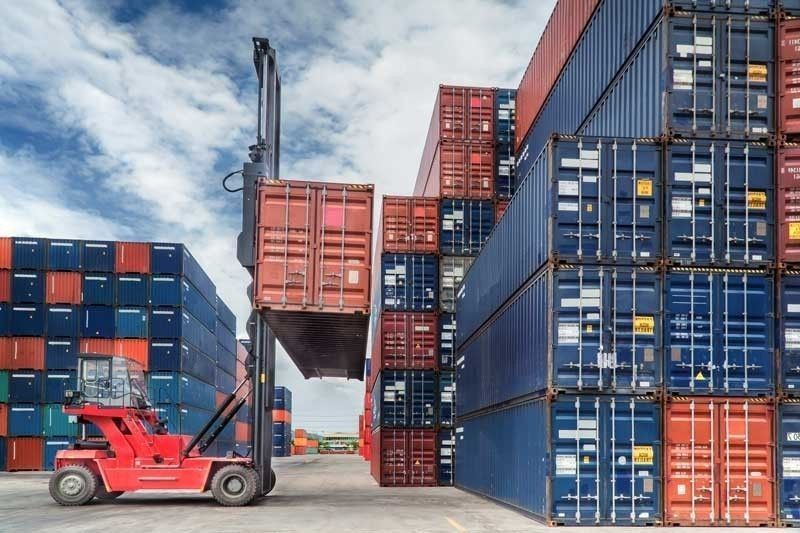
US and Chinese officials resume crucial trade talks, trying to resolve a year-long dispute that was on the verge of escalating with new US tariffs.
The Chinese delegation, including Vice Premier Liu He, was greeted by US Trade Representative Robert Lighthizer and Treasury Secretary Steven Mnuchin.
With US punitive tariffs on $200 billion in Chinese goods set to jump to 25% just after midnight, President Donald Trump said that an agreement remains "possible." — AFP
Hong Kong stocks plunged almost 3% Monday after US President Donald Trump threatened to hike tariffs on hundreds of billions of dollars worth of Chinese goods at the end of the week.
The Hang Seng Index plunged 2.90%, or 871.73 points, to 29,209.82.
— AFP
American firms in China remain frustrated and are growing more pessimistic about their prospects in the country, a top business lobby said Wednesday, while a trade war between Washington and Beijing continues to fester.
US businesses have traditionally held together the US-China relationship amid rough spots in bilateral relations, but the American Chamber of Commerce in China said in a white paper that the community could no longer be counted on to be the ballast of the relationship.
"Many of our longstanding concerns about the business environment in China remain unaddressed," the chamber said in a statement. -- Agence France-Presse
US President Donald Trump on Thursday said the United States and China were a month from a potentially "epic" trade agreement.
But, nine months into the two countries' trade war, the announcement was anticlimactic, as the White House had earlier stoked anticipation that Trump could announce a date for a summit to clinch a final deal with his Chinese counterpart Xi Jinping.
Global markets had also rallied in recent days, roused by the hope that an end to the skirmish between the world's two top economies was at last at hand.
"We will probably know over the next four weeks. It may take two weeks after that," Trump told reporters following a meeting with Beijing's trade envoy Liu He.
"It's looking very good." -- Agence France-Presse
China has unveiled tens of billions of dollars worth of tax and fee cuts as part of a drive to kickstart the stuttering economy, extending pledges worth $300 billion announced last month.
With growth at a near three-decade low and the economy struggling under the weight of the US trade row and a soft global outlook, leaders are looking to grease the cogs by getting the country's vast army of consumers to start spending. — AFP
President Donald Trump says that trade war negotiations with China should wrap up within four weeks and expressed optimism about striking a deal, as top negotiators held new phone talks.
"We are doing very well with China talks," Trump says. "We are getting what we have to get." — AFP
Beijing is hopeful about its next round of trade talks with the US, China's vice minister for commerce says, after revealing that top negotiators had tried to hammer out a deal over burgers and eggplant chicken.
China and the United States have been locked in a bruising trade war since last year, imposing tit-for-tat tariffs on more than $360 billion in two-way trade, which has left global markets reeling. — AFP
Tech giant Huawei on Thursday opens a legal front in its counter-offensive against US warnings that it could aid Chinese intelligence services, filing suit to overturn a US law that bars federal agencies from buying its products.
Huawei said the case was filed in a US District Court in Plano, Texas, challenging a 2019 defence bill that prevents government agencies from buying its equipment, services, or working with third parties that are Huawei customers.
The move may send a global signal that Huawei is willing to use all means, including national courts, to prevent attempts to exclude it from a race to the 5G market -- the future of high-speed telecommunications.
"The US Congress has repeatedly failed to produce any evidence to support its restrictions on Huawei products. We are compelled to take this legal action as a proper and last resort," Huawei's rotating chairman Guo Ping said. -- Agence France-Presse
Asian markets fluctuated Wednesday as investors await the latest news on the China-US trade talks, though Australian stocks rose and the local dollar fell as weak economic growth data fuelled speculation about a rate cut.
With expectations that Washington and Beijing will eventually strike a tariffs deal already baked into equity prices, analysts say officials will need to provide some clarity on progress to give markets another step up.
But there are warnings that with optimism so high, there could be a lot of disappointment if the final deal does not live up to the hype, or the two sides fail to even reach an agreement.
The talk is that high-level negotiations are ongoing in order to pave the way for a signing ceremony between Donald Trump and Xi Jinping later this month. -- Agence France-Presse
US-China trade talks have been "very difficult and taxing" and negotiators still have "lots left to do", but breakthroughs have been made in some areas, China's commerce minister says.
The comments as President Donald Trump has voiced confidence that he could soon sign a deal with President Xi Jinping to end a trade war that led to bruising tit-for-tat tariffs on goods from each country. — AFP
US President Donald Trump has urged China to abolish tariffs on agricultural products imported from the United States -- adding that trade talks between the rival powers were going well.
I have asked China to immediately remove all Tariffs on our agricultural products (including beef, pork, etc.) based on the fact that we are moving along nicely with Trade discussions....
— Donald J. Trump (@realDonaldTrump) March 1, 2019
....and I did not increase their second traunch of Tariffs to 25% on March 1st. This is very important for our great farmers - and me!
— Donald J. Trump (@realDonaldTrump) March 1, 2019
China says it "regrets" a World Trade Organization ruling in Washington's favour over a dispute on Chinese subsidies to wheat and rice producers.
The decision comes as the world's top two economies try to hammer out an agreement to settle a long-running trade row that has rattled global markets. — AFP
A business survey shows US companies in China forecast a gloomy year ahead, with many worrying about a deterioration in bilateral trade ties and nearly a quarter delaying investments.
The survey of 314 US businesses by the American Chamber of Commerce in China provides a full accounting of challenges American business face after Beijing and Washington exchanged tit-for-tat tariffs on more than $300 billion in two-way trade. — AFP
Top US and Chinese officials return to the daunting task of bridging a chasm between the world's two largest economies.
US President Donald Trump has repeatedly claimed the talks with Beijing are going "very well," but concrete signs of progress have not been apparent in the three months since the two sides agreed to pause their trade war in December. — AFP
President Donald Trump says that trade talks with China are complex but are "going very well" and again indicated the March 1 deadline for raising tariffs could be extended.
Officials has resumed the high-stakes negotiations aimed at ending a damaging tariff war between the economic superpowers. — AFP
The White House has announced that US-China trade talks aimed at ending a damaging tariff war will resume from Tuesday in Washington,
The last set of talks ended Friday in Beijing with no deal, though US President Donald Trump said the discussions were going "extremely well" and suggested he could extend a March 1 truce deadline for an agreement to be reached. — AFP
Top US and Chinese trade officials returned to the bargaining table Wednesday, working to avoid a sharp escalation in the trade war between the world's two largest economies.
At the head of a 30-person delegation from Beijing, Chinese Vice Premier Lie He greeted his counterpart, US Trade Representative Robert Lighthizer, against the backdrop of Washington's prosecution of Chinese telecoms giant Huawei, which has outraged Beijing and infused the negotiations with uncertainty.
The two sides have just a month remaining in a 90-day truce declared in December. Should the talks fail, US import duties on $200 billion in Chinese imports are due to more than double on March 2 -- something economists say could help knock the wind out of the global economy's sails. -- Agence France-Presse
China's top trade negotiator will travel to the United States for talks later this month ahead of a March deadline to avoid bruising tariff hikes, the commerce ministry says.
Vice Premier Liu He will visit Washington on January 30-31 for the negotiations, the ministry says, following up on talks between lower-level officials in Beijing earlier this month. — AFP
A Chinese auto maker will delay its entry into the US market until 2020 because of the trade war between Beijing and Washington, a company executive says at the auto show. — AFP
The United States says talks in Beijing on ending a bruising trade war focused on Chinese promises to buy more American goods.
But it gave no indication of progress on resolving disputes over Beijing's technology ambitions and other thorny issues. — AP
The presidents of China and the US have exchanged messages vowing to boost cooperation despite a bruising trade war on the 40th anniversary of the countries' diplomatic relations, Chinese state media reports.
Tensions between Beijing and Washington soared in 2018 over trade disputes, although US President Donald Trump has frozen the latest planned tariff hike and on Saturday reported "big progress" after a call with his counterpart Xi Jinping. — AFP
A US government delegation will travel to Beijing in early January for the first face-to-face talks since President Donald Trump and his Chinese counterpart agreed to a truce in their tariff war, according to a report.
Deputy US Trade Representative Jeffrey Gerrish will lead the US team for talks during the week of January 7, Bloomberg News say, citing two people familiar with the matter. — AFP
Huawei defends its global ambitions and network security on Tuesday in the face of Western fears that the Chinese telecom giant could serve as a Trojan horse for Beijing's security apparatus.
The company has been under fire this year, with Washington leading efforts to blacklist Huawei internationally and securing the arrest of the company's chief financial officer in Canada.
The concerns have mounted as countries begin to plan and roll out fifth-generation mobile communications, or 5G, the next milestone in the digital revolution, bringing near-instantaneous connectivity and vast data capacity.
Huawei has faced a tough year as western countries like the United States, Australia, New Zealand, Britain, pull back from using its products while concerns grow in Japan, France, Germany and even the Czech Republic over security issues.
Seeking to dispel those fears, the company took the unprecedented step Tuesday to open research and development labs to reporters at its headquarters in the southern city of Shenzhen. -- Agence France-Presse
Though markets are on edge and the arrest of a top Chinese executive threatened to spark a crisis, there are signs the US-China trade war can be resolved without further collateral damage to the global economy.
The whole world is watching the talks between Washington and Beijing, hoping a 90-day tariff truce will hold and the sides can end a dispute that threatens hundreds of billions of dollars in trade.
In recent days the small signs of progress, and perhaps more importantly the absence of new threats from US President Donald Trump, have cheered investors worldwide, reversing some of the bloodletting that erased all of 2018 gains on Wall Street.
And the arrest in Canada of a senior Huawei executive amid US charges the company violated sanctions on Iran raised fears the renewed tensions could disrupt the talks -- but so far this does not seem to have happened.
"What is clear is that both President Trump and the Chinese are trying to separate the issues," says Edward Alden, a trade expert at the Council on Foreign Relations.
In fact, Beijing on Friday announced that starting January 1 it would suspend the additional punitive tariffs on US autos imposed in retaliation for Trump's tariffs on China, cutting them to 15 percent from 40 percent. -- AFP
The Chinese commerce ministry says top Chinese and US negotiators held telephone talks to exchange views on the timetable of trade talks,
Vice Premier Liu He speaks with US Treasury Secretary Steven Mnuchin and US Trade Representative Robert Lighthizer 10 days after presidents Donald Trump and Xi Jinping agreed to a trade war truce. — AFP
China's factory inflation slows in November, a sign demand remains weak amid Beijing's ongoing trade war with the United States, while consumer inflation also flagged, official data showed Sunday.
The producer price index -- an important barometer of the industrial sector that measures the cost of goods at the factory gate -- climbed 2.7% on-year in November.
It ticked down from 3.3% the previous month, recording its weakest growth since October 2016, while remaining in line with the forecast in a Bloomberg News survey.
A slowdown in factory gate inflation reflects sluggish demand.
The consumer price index (CPI) -- a key measure of retail inflation -- rose 2.2% on-year, compared with 2.5% in October.
Food prices, up 2.5%, rose quicker than non-food prices, which were up 2.1%. Energy prices fell over the month. -- Agence France-Presse
China's export growth has sank in November as global demand weakened, adding to pressure on Beijing ahead of trade talks with Washington.
Exports rose 5.4 percent over a year ago to $227.4 billion, a marked decline from the previous month's 12.6 percent increase, customs data showed Saturday. Imports rose 3 percent to $182.7 billion, a sharp reversal from October's 20.3 percent surge. — AP
China says it would "immediately" implement measures agreed under a trade war truce with the United States -- and was confident it could reach a deal within 90 days.
The commerce ministry's remarks came days after US President Donald Trump and Chinese leader Xi Jinping agreed to give negotiators 90 days to resolve their trade spat. — AFP
China has demanded Canada release a Huawei Technologies executive who was arrested in a case that adds to technology tensions with Washington and threatens to complicate trade talks.
Huawei's chief financial officer, Meng Wanzhou, faces possible extradition to the United States, according to Canadian authorities. The Globe and Mail newspaper, citing law enforcement sources, said she is accused of trying to evade U.S. curbs on trade with Iran. — AP

China has promised to carry out a tariff cease-fire with Washington but gave no details that might help dispel confusion about what Presidents Xi Jinping and Donald Trump agreed to in Argentina.
China has yet to confirm Trump's claim Beijing promised to cut auto tariffs and immediately buy more American farm goods. Confusing and conflicting statements by Trump and U.S. officials, coupled with lack of Chinese confirmation, led to stock markets tumbling on Tuesday amid doubts about the chances for a final settlement of a fight over technology that threatens to chill global economic growth. — AP
The Trump administration is celebrating the 90-day truce it reached in its trade war with China as a significant breakthrough despite scant details, a hazy timetable and widespread skepticism that Beijing will yield to U.S. demands anytime soon. — AP
The White House says the US has agreed to suspend new China tariffs for 90 days, AFP reports.
China earlier said it had struck a deal to avoid further tariffs with the US, hailing a summit with US President Donald Trump.
Trump and his Chinese counterpart Xi Jinping "have come to an agreement on stopping imposition of additional tariffs," Foreign Minister Wang Yi said after the leaders' dinner on the sidelines of a G20 summit in Buenos Aires. -- Agence France-Presse
President Donald Trump and Chinese President Xi Jinping meet for some dinner diplomacy on the sidelines of the Group of 20 summit in Argentina.
The US-China trade war tops their agenda, but the two leaders also have other topics they hope to tackle, including Taiwan, the South China Sea and Americans being detained in China. — AP
China's factory activity fizzled in November, official data show, in the latest sign that the world's second-largest economy is losing steam in the midst of a US trade war.
The Purchasing Managers' Index, a key gauge of factory conditions, came in at 50.0 for the month, down from 50.2 in October and below forecast, the National Bureau of Statistics says. — AFP
A US trade representative has slammed Beijing for failing to offer "meaningful reform" on aggressive trade policies that harm US workers and industry, and threatened tariffs on Chinese autos.
The latest trade threat against China comes days before President Donald Trump is due to meet with Chinese leader Xi Jinping at a G20 summit in Argentina to defuse the ongoing trade conflict between the world's top two economic powers. — AFP
US Vice President Mike Pence has pilloried China's "opaque" chequebook diplomacy in a combative speech, taking aim at Beijing's business practices and warning trade tariffs would remain in place.
US-China trade tensions are likely to take centre stage at the APEC regional summit, with experts warning the spat could be catastrophic for the global economy, as the world's top two powers go head to head. — AFP
Vice President Mike Pence warns that US sanctions and pressure on China would remain in place until Beijing reforms its trade practices.
"We've put tariffs on $250 billion in Chinese goods and that number could more than double," he tells CEOs from around the region.
"We hope for better, but the United States will not change course until China changes its ways." — AFP
Protectionist actions are short-sighted and doomed to fail, Chinese President Xi Jinping says ahead of an APEC summit at which US-China trade tensions are likely to take centre stage.
"Attempts to erect barriers and cut close economic ties work against the laws of economics and the trends of history. This is a short-sighted approach and it is doomed to failure," Xi tells business leaders on the sidelines of the summit. — AFP
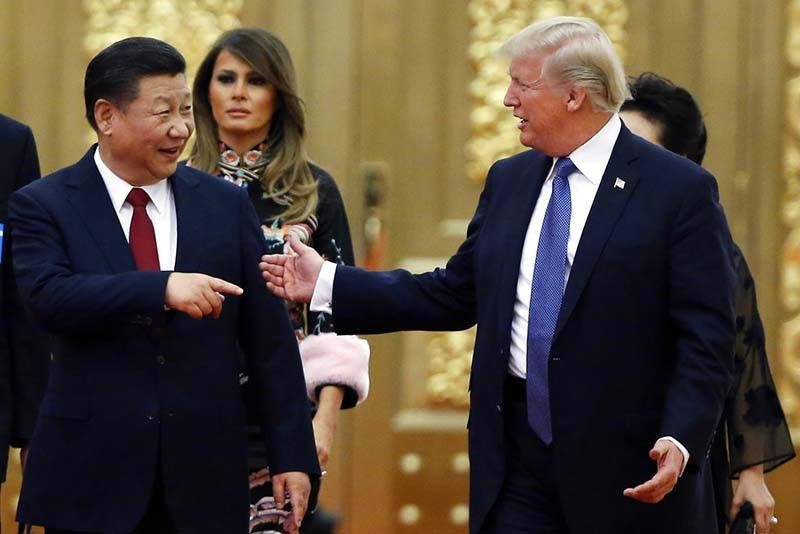
The United States and China resume top-level talks after months of spiraling tension, looking to see if they can find a way forward on disputes from trade to military friction.
Friday's delayed meeting in Washington comes weeks before US leader Donald Trump is expected to meet his Chinese counterpart Xi Jinping on the sidelines of the Group of 20 summit in Argentina, with both sides hoping they can announce some progress. — AFP
President Donald Trump has expressed confidence he can reach a deal to end a burgeoning trade war with China, saying he will meet his Chinese counterpart at the Group of 20 meetings in Argentina in about a month.
"I think we'll make a deal with China, and I think it will be a very fair deal for everybody," Trump says. — AP
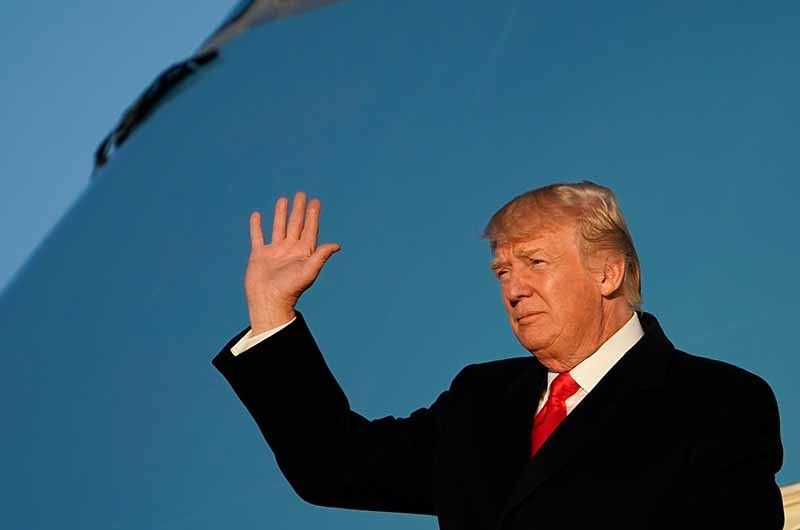
Hong Kong stocks soar almost four percent as investors cheer a report that Donald Trump has asked officials to draw up a draft bill as he eyes a potential trade deal with China following talks with President Xi Jinping.
The Hang Seng Index jumps 3.94 percent, or 1,001.55 points, to 26,417.55 in afternoon trade. — AFP
China says it is in communication with the United States amid reports of a planned meeting between President Xi Jinping and President Donald Trump next month following a dive in the U.S. stock market blamed partly on a growing trade war between the world's two largest economies.
Foreign ministry spokesman Lu Kang offered no specifics Friday, saying only that China had noted the reports and maintains "communication on dialogues and exchanges at all levels" with the U.S.
The reported meeting would take place during the G-20 summit in Argentina in late November.
The Wall Street Journal and the Washington Post both cited White House sources as saying Trump has decided to proceed with the meeting with Xi. — AP
The heads of the World Bank and IMF urge the U.S. and China to play by world trade rules and de-escalate a dispute over Beijing's technology development strategy that threatens to do lasting damage to the global economy. — AP
China says it would "take countermeasures" after US President Donald Trump announced new tariffs on $200 billion of Chinese imports taking effect next week.
"In order to safeguard its legitimate rights and interests and the global free trade order, China has no choice but to take countermeasures in lockstep," the commerce ministry says in the statement, which did not mention a previous threat to add tariffs on $60 billion in US imports if Washington imposed this new wave of levies. — AFP
China's vice premier warns that protectionism from "individual countries" poses a "serious hazard" to global growth, in an apparent reference to the US which has imposed tariffs on Chinese goods worth $50 billion with more threatened.
"Some individual countries' protectionist and unilateral measures are gravely undermining the rules-based multilateral trading regime, posing a most serious hazard to the world economy," Hu Chunhua says at a regional World Economic Forum in Hanoi. — Agence France-Presse
China is trying to defuse a spiraling tariff war with Washington over technology policy by highlighting gains in other trade-related areas.
The official, Shen Changyu, points to improvements in fighting violations, previously a target of complaints by the United States, Europe and other traders. — AP
China's government says it will make economic changes at its own pace regardless of U.S. pressure and that their spiraling dispute over technology can only be settled through talks as equals.
A Commerce Ministry spokesman gave no indication of possible plans for more negotiations after talks last week in Washington ended without progress. — AP
Chinese and US negotiators held "constructive and frank" trade talks in Washington this week and the two sides will keep in contact "regarding future plans", the Chinese commerce ministry says.
Delegations led by Chinese Vice Commerce Minister Wang Shouwen and US Treasury under secretary David Malpass held talks without announcing any breakthroughs while both sides launched a new batch of tit-for-tat tariffs. — AFP
The United States and China impose more tariff hikes on billions of dollars of each other's automobiles, factory machinery and other goods in an escalation of a battle over Beijing's technology policy that companies worry will chill global economic growth.
The 25 percent increases take effect as envoys from both sides held their first high-level talks in two months in Washington. — AP
China's auto sales shrink by 5.3 percent in July from a year earlier as SUV demand sagged, adding to signs of economic malaise amid a tariff battle with Washington.
The China Association of Automobile Manufacturers, says that drivers in the biggest auto market bought 1.6 million sedans, SUVs and minivans. Total sales, including trucks and buses, fall 4 percent to 1.9 million.
Demand has cooled amid forecasts of slowing economic growth after Beijing tightened lending controls to cool surging debt. — AP
Chinese President Xi Jinping arrives in Africa on a four-nation visit seeking deeper military and economic ties while his rival in a bitter trade war, the Trump administration, shows little interest in the world's second most populous continent.
China is already Africa's largest trading partner, and it opened its first military base on the continent last year in the Horn of Africa nation of Djibouti, which this month launched a China-backed free trade zone it calls the largest in Africa. — AP
China's June trade grows by double digits amid mounting tension with Washington but Beijing warns its exporters face "rising instabilities and uncertainties." — AP
The Chinese government has vowed to take "firm and forceful measures" against U.S. threats to expand tariff hikes.
The comment by a Chinese Foreign Ministry spokeswoman followed the U.S. Trade Representative's announcement it was preparing to impose 10 percent tariffs on a wider range of goods from fish sticks to French doors in the escalating trade dispute.
Asked what Beijing would do, foreign ministry spokeswoman Hua Chunying gave no details but says, "We will take firm and forceful measures." — AP
China criticizes new US tariff threat as 'totally unacceptable,' says it will take 'necessary countermeasures' — AP
The Trump administration is readying tariffs on another $200 billion in Chinese imports, ranging from burglar alarms to mackerel, escalating a trade war between the world's two biggest economies.
The Office of the U.S. Trade Representative proposed 10 percent tariffs Tuesday on a list of 6,031 Chinese product lines.
The office will accept public comments and hold hearings on the plan Aug. 20-23 before reaching a decision after Aug. 31, according to a senior administration official who briefed reporters on condition of anonymity. — AP
A Chinese government spokesman has said Beijing "will not bow in the face of threats and blackmail" on the eve of U.S. tariff hikes and will defend its interests.
The Commerce Ministry spokesman, Gao Feng, says that Beijing will wait to see what Washington does before taking action of its own.
The Trump administration is poised to raise tariffs on $34 billion of Chinese imports in the dispute over technology policy. China has threatened to retaliate. — AP
Fears that China is threatening U.S. leadership in robots, electric cars and other advanced technologies are pushing the world's two biggest economies toward a full-blown trade war as the two sides prepare to impose tariffs on billions of dollars' worth of each other's products.
In fact, China remains heavily reliant on technologies from the West.
Tech giant ZTE Corp.'s near-death experience after Washington barred it from buying U.S. components was a stark reminder that China's industry leaders cannot function without American technology. — AP
China's No. 2 leader, Premier Li Keqiang, has appealed to Korean business leaders to help "protect free trade" in Beijing's latest effort to recruit allies for its escalating dispute with Washington.
Li tells visiting CEOsthat Beijing was willing to "further open up" and promote economic globalization.
They were the latest targets of a Chinese charm offensive that also has been aimed at securing European support against U.S. President Donald Trump's threats of tariff hikes in the dispute over trade and technology.
Chinese relations with Seoul are strained after Beijing destroyed retailer Lotte's business in China last year in retaliation for its sale of land to install an anti-missile system. — AP
China has eased limits on foreign ownership in auto manufacturing, insurance and other fields but didn't directly address complaints that are fueling conflict with Washington over trade and technology.
The investment changes had been sought by Washington, Germany and other trading partners. They complain Beijing blocks access to much of its state-dominated economy while Chinese companies operate freely in other countries.
China's announcement followed President Donald Trump's threat to restrict Chinese investment in the United States. — AP
President Donald Trump is suggesting his administration may back away from previously announced plans to impose limits on Chinese investment in American technology companies and high-tech exports to China, instead choosing to call upon Congress to act. — AP
China accuses the United States of using bullying tactics and blackmail in threatening to impose tariffs on hundreds of billions of dollars of Chinese imports, ramping up criticism that the measures levied in the name of balancing trade would harm both countries' companies and the world economy.
Commerce Ministry spokesman Gao Feng says the U.S. was damaging the global trading order and that its methods would harm its own business interests as well as those of trading partners. — AP
One in five foreign companies in China feels compelled to hand over technology for market access, a business group says, highlighting a key irritant in an escalating U.S.-Chinese trade dispute.
The European Union Chamber of Commerce in China's report follows President Donald Trump's order for tariffs on additional Chinese goods in response to complaints Beijing steals or pressures companies to hand over technology.
Out of 532 European companies that responded to a survey, 19 percent "felt compelled to transfer technology in exchange for market access" despite Chinese assurances that it isn't required, the chamber says. — AP
Global stock markets fell Tuesday after President Donald Trump threatened to put tariffs on another $200 billion in imports from China, and the Chinese government said it would retaliate, The Associated Press.
The Dow Jones industrial average lost 370 points, or 1.5 percent. The Hang Seng index in Hong Kong lost 2.8 percent. Major stock indexes in Asia and Europe also took sharp losses. Trump's new proposal calls for a 10 percent tariff on $200 billion in goods, and Beijing said it would respond with "comprehensive measures." It doesn't import enough goods from the U.S. to match the scale of Trump's proposal but could adopt other methods.
President Donald Trump directs the U.S. Trade Representative to prepare new tariffs on $200 billion in Chinese imports as the two nations moved closer to a potential trade war.
The tariffs, which Trump wants set at a 10 percent rate, would be the latest round of punitive measures in an escalating dispute over the large trade imbalance between the two countries. Trump recently ordered tariffs on $50 billion in Chinese goods in retaliation for intellectual property theft. The tariffs were quickly matched by China on U.S. exports, a move that drew the president's ire. — AP
China's government denounces President Donald Trump's threat of new tariffs on $200 billion of Chinese goods as blackmail and warned it would respond with "strong countermeasures."
The Commerce Ministry warns Beijing is ready to "defend the interests of the Chinese people and enterprises." — AP
US farmers find themselves in the crosshairs of a trade war with China and others launched by President Donald Trump, who was elected with the support of many in rural America.
"For American farmers, this isn't theoretical anymore, it's downright scary," the Farmers for Free Trade lobbying group says of the prospects for escalating tariffs.
"It's no longer a negotiating tactic, it's a tax on their livelihoods."
China is the largest buyer of soy beans, buying $12 billion in 2017, about 30 percent of the US harvest. — AFP
China has fired back in a spiraling trade dispute with President Donald Trump by raising import duties on a $34 billion list of American goods including soybeans, electric cars and whiskey.
The government says it was responding in "equal scale" to Trump's tariff hike on Chinese goods in a conflict over Beijing's trade surplus and technology policy that companies worry could quickly escalate and chill global economic growth.
The Commerce Ministry says "the Chinese side doesn't want to fight a trade war, but facing the shortsightedness of the U.S. side, China has to fight back strongly."
The ministry says it's also scrapping deals to narrow Beijing's multibillion-dollar trade surplus with the U.S. by purchasing more American farm goods, natural gas and other products.
The Ministry of Finance says Beijing will impose an additional 25 percent tariff starting July 6 on 545 products from the U.S. including soybeans, electric cars, orange juice, whiskey, salmon and cigars. — AP
China plans to impose 25 percent tariffs on roughly $50 billion of U.S. goods in retaliation for the Trump administration's announcement Friday that it would impose duties of the same amount on $50 billion of Chinese goods, according to a report from the official news agency Xinhua.
The tariffs will come in two steps, beginning with duties on 545 U.S. products worth $34 billion that will be focused on farm goods, cars and seafood, Xinhua said.
A second round of tariffs, to be imposed on an unspecified date, on 114 items worth $16 billion will mostly hit chemicals, medical equipment and energy products.
Trump has threatened to hit China with duties on another $50 billion of goods if it retaliates. China "has noticed the U.S. statement" and "reserves its rights to take corresponding measures," a government official said, according to Xinhua. — AP
China vows to "immediately" retaliate to US tariffs as Washington moved closer to imposing duties that could trigger a trade war.
"If the US side adopts unilateral protectionist measures and damages China's interests, we will immediately react and take necessary measures to firmly safeguard our legitimate rights and interests," says foreign ministry spokesman Geng Shuang during a regular news briefing.
US President Donald Trump is due to unveil later Friday a final list of Chinese imports that would face punishing tariffs, though the administration has not yet publicly said when the measures will be imposed. — AFP
President Donald Trump approves a plan to impose punishing tariffs on tens of billions of dollars of Chinese goods, a move that could put his trade policies on a collision course with his push to rid the Korean Peninsula of nuclear weapons.
Trump has long vowed to fulfill his campaign pledge to clamp down on what he considers unfair Chinese trading practices. But his calls for billions in tariffs could complicate his efforts to maintain China's support in his negotiations with North Korea. — AP
China's government says some Chinese exporters are rushing to fill orders due to concern about possible changes in trade risks.
The White House is preparing a list of Chinese goods targeted for a tariff hike, but the Commerce Ministry spokesman who made the comment Thursday didn't mention Washington and said those exporters are "not the mainstream."
The threatened U.S. tariff hikes are in response to complaints Beijing steals or pressures foreign companies to hand over technology.
Commerce Ministry spokesman Gao Feng said at a regular briefing, "a few companies have increased the number of 'short orders' to avoid risks. However, this is not the mainstream." — AP
The United States has reached a deal with Chinese telecommunications giant ZTE Corp. that includes a $1-billion fine, according to US Commerce Secretary Wilbur Ross, the Associated Press reports.
The fine comes on top of the roughly $1 billion ZTE has already paid for selling equipment to North Korea and Iran in violation of US sanctions.
Ross, speaking on CNBC on Thursday, said that ZTE also must put $400 million in escrow, which will be forfeited if there are any violations of the agreement.
Ross also said that a compliance team picked by the US will be embedded at ZTE and that the Chinese company must change its board and executive team in 30 days.
US President Donald Trump's hard-line views on trade, a staple of his message long before he entered politics, are beginning to collide with the cold realities of global geopolitics, The Associated Press reports.
Trade talks on China and the North American Free Trade Agreement have hit stumbling blocks, posing a challenge for a president who vowed to make trade deals more equitable for the United States during his 2016 campaign and who famously tweeted that trade wars are "easy to win."
The United States and China are pulling back from the brink of a trade war after the world's two biggest economies reported progress in talks aimed at bringing down America's massive trade deficit with Beijing, the Associated Press reports.
"We are putting the trade war on hold," Treasury Secretary Steven Mnuchin said Sunday.
China calls for US trade talks to be conducted on an equal footing, as Beijing's top economic official is due in Washington next week for more discussions on a dispute that could trigger tariffs on billions of dollars of goods this month.
The visit by Vice Premier Liu He -- considered President Xi Jinping's right-hand man on economic issues -- comes after he led talks in Beijing last week with a high-level US delegation that made little headway in resolving the standoff.
The meetings follow a series of tit-for-tat threats of tariffs on billions of dollars of goods sparked earlier this year by US President Donald Trump, who accuses China of using unfair practices to gain an advantage over US exporters costing American jobs. — AFP
China's exports rebounded last month from a brief downturn while its politically sensitive trade surplus with the United States expanded, according to official data released Tuesday.
Customs data show that exports jumped 21.5 percent from a year earlier in April, bouncing back from a contraction the previous month thanks to resurgent global demand.
Imports expanded 12.9 percent year-on-year in dollar terms, leaving the country's politically sensitive monthly trade surplus with the rest of the world at $28.8 billion, a turnaround from the previous month's $5 billion deficit.
China's trade surplus with the U.S. swelled to $22.2 billion, up from $15.4 the previous month, as its exports to the U.S. grew at double digit rates.
The latest figures come as China and the United States spar over Beijing's perennial trade surplus. — AP
President Donald Trump is tweeting the U.S. trade delegation is on its way back from China.
Trump says "we will be meeting tomorrow to determine the results, but it is hard for China in that they have become very spoiled with U.S. trade wins!"
Our high level delegation is on the way back from China where they had long meetings with Chinese leaders and business representatives. We will be meeting tomorrow to determine the results, but it is hard for China in that they have become very spoiled with U.S. trade wins!
— Donald J. Trump (@realDonaldTrump) May 5, 2018
The Trump administration wants China to reduce the trade deficit with the U.S. by $200 billion by the end of 2020. A U.S. official confirmed the authenticity of a document making that and other requests presented to China ahead of trade talks that ended in Beijing Friday.
The four-page list also included demands that China immediately stop providing subsidies to industries listed in a key industrial plan. The list also includes a demand that China end some of its policies related to technology transfers, a key source of tension underlying the dispute. — AP
The prospect of a trade war poses "downside risks" to the US economy, which otherwise is poised to grow at a solid pace, the Federal Reserve says.
While the Fed says the steep tariffs on steel and aluminum imports that President Donald Trump imposed last month will not on their own have a significant effect, the possibility of "retaliatory trade actions by other countries" can be harmful.
China President Xi Jinping promised Tuesday to cut China's auto tariffs and improve intellectual property protection in possible concessions aimed at defusing a worsening dispute with Washington over trade and technology that investors worry could set back the global economic recovery, the Associated Press reports
President Donald Trump instructed the U.S. trade representative to consider slapping an additional $100 billion in tariffs on Chinese goods Thursday in a dramatic escalation of the trade dispute between the two countries.
Trump's surprise move came a day after Beijing announced plans to tax $50 billion in American products, including soybeans and small aircraft, in response to a U.S. move earlier this week to slap tariffs on $50 billion in Chinese imports.
And it intensified what was already shaping up to be the biggest trade battle since World War II. Global financial markets had fallen sharply as the world's two biggest economies squared off over Beijing's aggressive trade tactics. But they had calmed down Wednesday and Thursday on hopes the U.S. and China would find a diplomatic solution.
Forecasters say the impact of Monday's move should be limited, but investors worry the global recovery might be set back if other governments respond by raising import barriers, the Associated Press reports.
The tariffs "signal a most unwelcome development, which is that countries are becoming protectionist," says economist Taimur Baig of DBS Group. But in commercial terms, they are "not very substantial" compared with China's $150 billion in annual imports of U.S. goods, he says in an AP report.
Monday's tariff increase will hit American farm states, many of which voted for Trump in 2016.
China has raised import duties on a $3-billion list of U.S. pork, fruit and other products Monday in an escalating tariff dispute with President Donald Trump that companies worry might depress global commerce, the Associated Press reports.
The Finance Ministry said it was responding to a U.S. tariff hike on steel and aluminum that took effect March 23.
US President Donald Trump says North American neighbors Canada and Mexico will get no relief from his new tariffs on steel and aluminum imports unless a "new and fair" free trade agreement is signed.
The Trump administration says the tariffs are necessary to preserve the American industries—and that doing so is a national security imperative. But Trump's latest tweets suggest he's also using the upcoming tariffs as leverage in ongoing talks to revise the North American Free Trade Agreement. The latest round of a nearly year-long renegotiation effort is concluding this week in Mexico City. — Associated Press
- Latest
- Trending





























